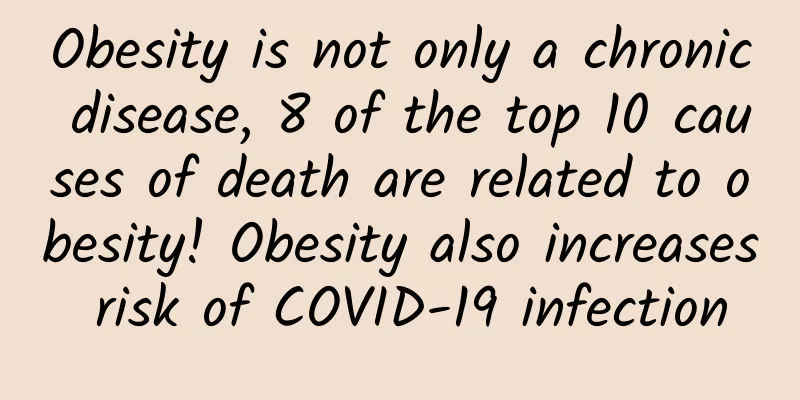Obesity is not only a chronic disease, 8 of the top 10 causes of death are related to obesity! Obesity also increases risk of COVID-19 infection

|
Obesity has become one of the top global health issues that cannot be ignored. According to statistics from the World Health Organization, the number of obese people in the world in 2016 was nearly three times that of 1975. In 2016, among adults aged 18 and above, there were more than 1.9 billion overweight people, of which more than 650 million were obese. The National Health Administration of the Ministry of Health and Welfare also joined hands with the Taiwan Obesity Medicine Association to call for action. Obesity has long been recognized by the World Health Organization as a chronic disease, and is associated with as many as eight of the top ten causes of death in Taiwan, and is also a risk factor for severe COVID-19 infection. To advocate the urgency and importance of ending obesity, the World Obesity Federation has set the theme of World Obesity Day on March 4 this year as "Everybody Needs to Act", calling on everyone to face the issue of obesity. According to the definition of the National Health Administration, adults aged 18 and above are considered "overweight" when their body mass index (BMI) is ≥24, and "obese" when their BMI is ≥27. From 2016 to 2019, the rate of overweight and obesity among adults in Taiwan was as high as 47.9%, with nearly half of adults having weight problems, and the prevalence of obesity among children and adolescents was as high as 11.21%. The above data all show that there is still room for improvement in Taiwan's overweight and obesity prevalence. In addition to BMI, waist circumference is also an important indicator of a healthy body. According to the definition of the National Health Administration, abdominal obesity is defined as a waist circumference of ≥90cm for men and ≥80cm for women. This indirectly reflects the accumulation of visceral fat, which affects the body's metabolism and leads to increased blood triglyceride concentrations, increased blood sugar, and an increased risk of cardiovascular disease and diabetes. Eight of the top ten causes of death are related to obesity, which increases the risk of severe illness when contracting COVID-19 Lin Wenyuan, chairman of the Taiwan Obesity Medicine Association, said that obesity is a chronic disease that not only causes physical decline, but may also lead to various metabolic and gynecological diseases. Chronic diseases related to obesity also include type 2 diabetes, metabolic syndrome, cardiovascular disease, degenerative arthritis, cancer, sleep apnea, depression, non-alcoholic fatty liver disease, infertility, gastroesophageal reflux disease, etc. Eight of the top ten causes of death in Taiwan are related to obesity, including cancer, heart disease, cerebrovascular disease, diabetes, hypertensive diseases, chronic lower respiratory tract diseases, nephritis, nephrotic syndrome and kidney disease, chronic liver disease and cirrhosis, leading to increased medical expenses and social costs. Not only that, obesity also increases the risk of severe illness when contracting COVID-19. The hospitalization rate is three times that of people with normal weight, and the mortality rate of obese hospitalized patients is twice that of those with healthy body weight. Everyone needs to take action to manage weight: Three action plans for "ACT" Therefore, the Taiwan Obesity Medical Association echoes the 2022 World Obesity Day theme "Everybody Needs to Act" and proposes three "ACT" action plans for weight management: Accompany and support: Overweight and obese people need empathy and companionship to support their determination to lose weight in the long term, and they also need professional medical assistance. From relatives and friends to the entire society, everyone should replace discrimination with support and provide companionship and help to those who are trying to lose weight. Calories Light card management: An effective weight loss plan should be combined with calorie counting and proper nutrition, plus moderate exercise to burn calories and achieve a healthy weight range. Training Weight Management and National Learning: For the general public, resources such as the National Health Administration's Healthy 99 website are used to help people develop good living habits and pursue a healthy body. For the medical staff, the Taiwan Obesity Medicine Association provides medical lectures on weight management for professionals, allowing medical staff from the grassroots to medical centers to help and support people in weight management through various channels. Dr. Zhang Haoxiang, director of the Taiwan Obesity Medicine Association, also shared that he has seen many cases in clinical practice where people fell into a cycle of getting fatter and fatter because they did not have the correct concept of weight loss. Lin Xiaodi (pseudonym) has weighed over 100 kilograms since junior high school because he loved drinking sugary drinks. His liver function index also soared along with his weight. Over the years, he has experienced several weight loss and weight gain, and his weight has gone up and down like a yo-yo. After entering university, Lin started to pay attention to his appearance and finally cooperated with the medical team to control his weight. Through diet control and regular exercise, his weight dropped to 80 kg within a year and he successfully maintained the weight loss results. His liver function index also returned to normal, and he regained his confidence and health. Dr. Zhang Haoxiang called for that although losing weight is difficult, the greater challenge is to maintain the weight loss results for a long time, which requires the assistance of a professional medical team to achieve twice the result with half the effort. Doctors also remind that there is no need to lose weight quickly or too much. Gradually reducing 5-10% of body weight can bring many benefits to health. In addition to diet and exercise, there are other medical options for obesity treatment, such as medication and surgery. However, no matter which method is used, the assistance and guidance of a professional medical team is required to achieve the goal of healthy weight loss and maintaining body shape. Improving the obesity problem is urgent. Maintaining a healthy body shape not only makes you more beautiful and confident, but is also the key to staying away from chronic diseases. The National Health Administration also calls on everyone, whether they are themselves or their relatives and friends, to adopt a more positive and proactive approach when facing obesity problems, replace blame and discrimination with care and encouragement, and to have the courage to seek help from professional medical teams. Everyone can change the world's most serious health problem through action. |
Recommend
How to treat pelvic effusion more effectively
How to treat pelvic effusion more effectively? 1....
Losing weight only makes your belly fatter, not your breasts smaller! Yam, soy milk, 5 foods to protect your career line
Losing weight is a goal that many women aspire to...
What are the precautions during painless abortion surgery?
Many women who are pregnant for the first time ha...
What treatment is needed for lupus erythematosus
In recent years, lupus erythematosus has become o...
What causes women to change to vulvar white shift?
Vulvar leukoplakia is very harmful to women and i...
Why do unmarried women suffer from adnexitis?
Why do unmarried women suffer from adnexitis? Man...
What can I eat to relieve dysmenorrhea?
Dysmenorrhea not only affects women's physica...
What is menorrhagia? Is menorrhagia a symptom of uterine fibroids?
Uterine fibroids are one of the most common benig...
What are the signs of miscarriage in three months of pregnancy?
I believe you are not unfamiliar with the symptom...
At the end of the year, eat a lot of good food before the year-end party, but be careful of the landmine foods that may cause obesity, high blood sugar and high blood pressure!
At the end of the year, there are many banquets, ...
There are three main types of vaginitis
Vaginitis is one of the gynecological diseases, a...
What is the best diet for pelvic effusion and how to take care of it
Patients with pelvic effusion should first pay at...
Introducing the reasons for doing B-ultrasound before medical abortion
Many women have called to ask why they need to do...
Tips for preventing dysmenorrhea in daily life
In daily life, dysmenorrhea is a preventable gyne...
Can you exercise during menstruation? Six things to pay attention to when exercising
"Good friends" are here. It is very dif...









